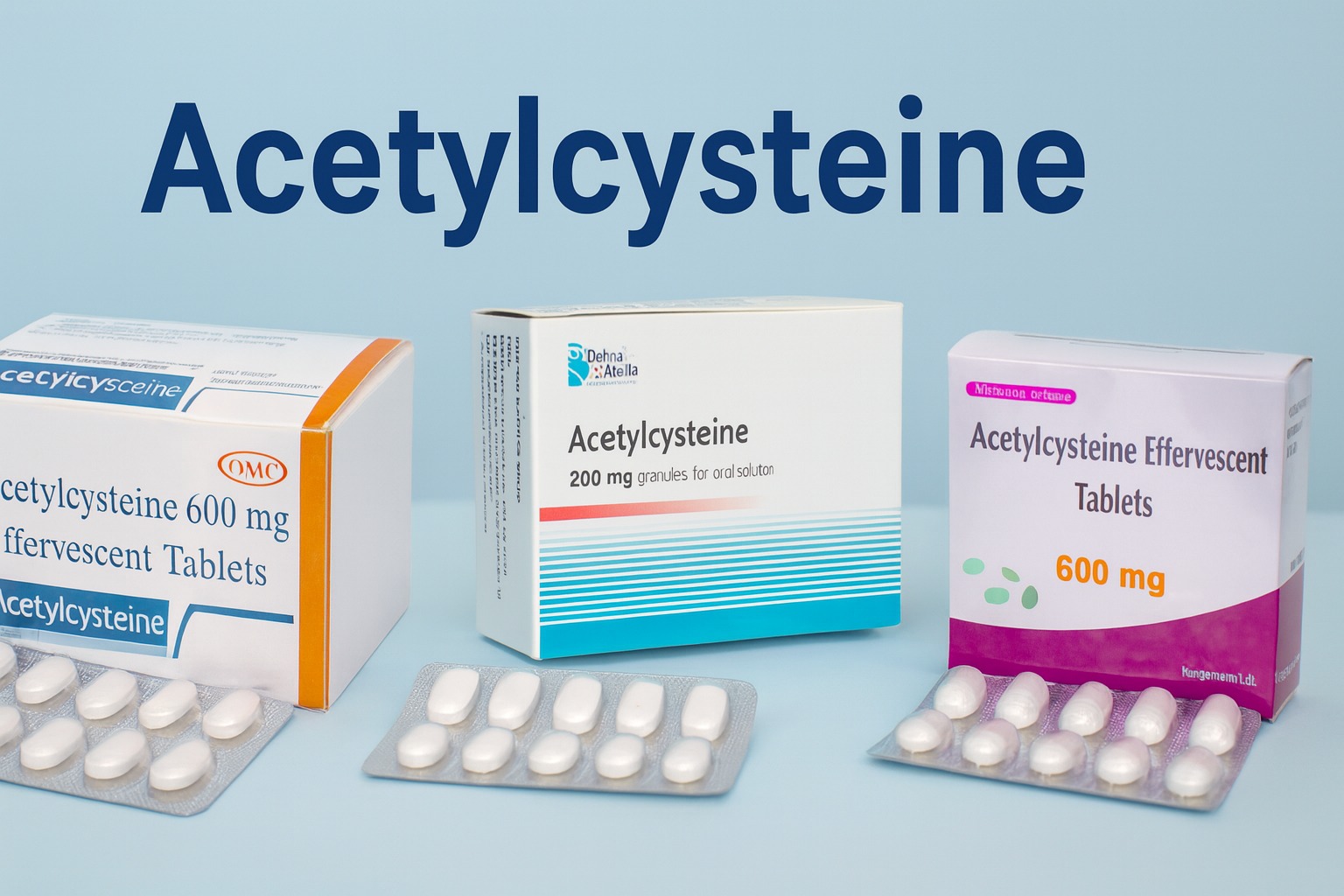Acetylcysteine, also known as N-Acetylcysteine (NAC), is a powerful compound widely recognized for its role in medicine and wellness. It has been used for decades as both a prescription drug and a dietary supplement, helping with everything from liver protection to respiratory health. If you have come across terms like acetylcysteine 600 mg, NAC for liver, or Mucomyst, you are essentially reading about the same compound.
In this article, we’ll cover everything you need to know about acetylcysteine:
- What it is
- How it works
- Common uses in medicine
- Dosage guidelines
- Benefits and potential side effects
- Frequently asked questions
This comprehensive guide is designed to help readers (and search engines) understand the importance of NAC, in clear and simple language.
What is Acetylcysteine?
Acetylcysteine is a modified form of the amino acid cysteine. It acts as a precursor to glutathione, one of the body’s most important antioxidants. Because of this role, NAC helps fight free radicals, detoxify harmful substances, and protect vital organs.
It is available in different forms:
- Tablets and capsules (oral supplements)
- Syrup or oral solution (often for coughs)
- Injections (for emergency use in hospitals)
- Inhalation solutions (for lung conditions)
Doctors often prescribe NAC under brand names like Mucomyst or simply as acetylcysteine 600 mg.
How Does Acetylcysteine Work?
The power of acetylcysteine lies in its dual action:
- Antioxidant support – NAC increases glutathione levels, which protects the liver, kidneys, and lungs from toxins.
- Mucolytic action – It helps break down thick mucus in the lungs, making it easier to cough up and breathe.
This makes it valuable in both chronic conditions like COPD (chronic obstructive pulmonary disease) and in emergencies such as acetaminophen (paracetamol) overdose.
Medical Uses of Acetylcysteine
Acetylcysteine has been researched extensively, and its clinical uses are well established. Here are the main areas where it is used:
1. Liver Protection
One of the most important uses of NAC is in treating acetaminophen (paracetamol) overdose. In fact, it is the standard antidote given in hospitals because it prevents liver failure by restoring glutathione levels.
2. Respiratory Health
Acetylcysteine is widely prescribed for conditions where thick mucus is a problem, such as:
- Chronic bronchitis
- COPD
- Asthma
- Cystic fibrosis
By thinning mucus, NAC improves airflow and helps clear the lungs.
3. Kidney Protection
NAC is sometimes used before certain imaging tests that involve contrast dyes, as it may protect the kidneys from damage.
4. Mental Health and Neurology
Recent studies suggest NAC may support people with depression, anxiety, bipolar disorder, and even addiction recovery. This is because it affects glutamate levels, an important brain chemical.
5. Immune System Support
Because NAC helps boost antioxidants, it strengthens the immune system and may reduce inflammation.
Acetylcysteine Dosage
The dosage of NAC depends on the condition being treated and the form used.
- For acetaminophen overdose: Usually given as an injection or IV in hospital settings.
- For respiratory conditions: Often prescribed as 200–600 mg daily in divided doses.
- As a dietary supplement: Commonly available in 600 mg capsules, taken once or twice daily.
- Inhalation therapy: Delivered via a nebulizer, typically in hospitals.
Always follow your doctor’s instructions. Self-medicating with NAC is not recommended for serious conditions.
Benefits of Acetylcysteine
Acetylcysteine offers a wide range of health benefits:
- Detoxifies the liver – Prevents damage from drugs, alcohol, and toxins.
- Improves lung function – Makes mucus less sticky and easier to clear.
- Supports mental health – May reduce symptoms of depression and anxiety.
- Boosts antioxidants – Fights free radicals that cause aging and cell damage.
- Protects kidneys and heart – Reduces oxidative stress on vital organs.
- May aid fertility – Research suggests it could improve ovarian function in women with PCOS.
Possible Side Effects
Like all medications, NAC is generally safe but may cause some side effects:
- Common side effects: nausea, vomiting, diarrhea, stomach upset.
- Less common: rash, fever, drowsiness.
- Inhalation form: may cause cough, chest tightness, or irritation.
- Rare: severe allergic reactions (anaphylaxis), especially with IV administration.
Most side effects are mild, but medical attention is necessary if symptoms worsen.
Who Should Avoid Acetylcysteine?
NAC may not be suitable for:
- People with asthma (inhaled NAC may cause bronchospasms).
- Those with active ulcers (it may irritate the stomach lining).
- Pregnant or breastfeeding women (use only under medical advice).
Forms of Acetylcysteine
- Acetylcysteine 600 mg Tablets/Capsules – Most common supplement form.
- Syrup or Oral Solution – Often given for coughs and mucus buildup.
- Injection (IV/IM) – Used in emergencies like acetaminophen overdose.
- Inhalation (Nebulizer) – For mucus clearance in chronic lung conditions.
Frequently Asked Questions (FAQs)
Q1: What is acetylcysteine 600 mg used for?
It is commonly used for mucus clearance in respiratory conditions and as a supplement for antioxidant support.
Q2: Is NAC the same as acetylcysteine?
Yes, NAC (N-acetylcysteine) is simply the abbreviated name.
Q3: Can NAC be taken daily?
Yes, many people take NAC 600 mg daily as a supplement, but medical supervision is recommended.
Q4: Is acetylcysteine safe?
Generally, yes. However, those with asthma or stomach issues should use caution.
Q5: Does NAC help with mental health?
Research suggests it may help with depression, bipolar disorder, and even addiction, but it is not a replacement for prescribed medication.
Final Thoughts
Acetylcysteine (NAC) is more than just a prescription drug — it is a life-saving antidote, a lung-clearing agent, and a powerful antioxidant. Whether prescribed by a doctor for medical conditions or taken as a supplement for general health, NAC continues to play a vital role in modern healthcare.
If you’re considering NAC for health support, consult your doctor first. With the right dosage and monitoring, acetylcysteine can help protect your liver, lungs, and overall wellbeing.


Leave a Comment